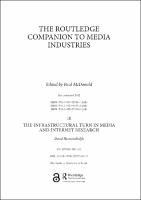Chapter 10 The Infrastructural turn in Media and Internet Research
Proposal review
Abstract
In recent years, media studies and internet studies have paid increasing attention to the concept of infrastructure, and to the related concept of distribution. In this chapter I discuss some of the benefits for media and internet research brought about by the turns to infrastructure and distribution, notably a welcome concern with the mundanity and ordinariness of existing systems rather than optimistic speculation about future impacts, and an invigorating interest in questions of representation and meaning in relation to often taken-for-granted technologies. But I also discuss some of the problems surrounding the infrastructural turn in media and internet research: a tendency to use the term “infrastructure” in such a variety of ways that it risks losing its analytical value; an uncertain engagement with ideas of materiality and “relationality”; and a tendency towards banality and vagueness (including dubious defenses of vagueness itself). I close by reflecting on how the problems identified seem to have led to a neglect of other traditions of research, such as political economy of media, that might provide insights into the workings of media infrastructures as traditionally understood, but in a call for synthesis, I also point to those other traditions have also failed to pay due attention to the best contributions of recent media infrastructural studies.
Keywords
companion, industries, media industries, production studies, global media studies, international screen studies, critical political economyDOI
10.4324/ 9780429275340-13ISBN
9780367225261, 9781032065342, 9780429275340Publisher
Taylor & FrancisPublisher website
https://taylorandfrancis.com/Publication date and place
2021Grantor
Imprint
RoutledgeClassification
Media studies


 Download
Download